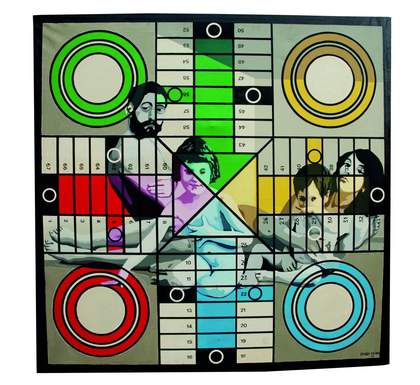Was ‘pop art’ a term used by yourself or colleagues or was there a different terminology that referred to a new figurative art movement in the 1960s and early 1970s?
The term most frequently used was pop.
Did you ever consider yourself (now or in the past) a pop artist?
In the past, yes. Currently, no.
Did your work engage with current events in the 1960s and early 1970s?
I suppose so.

Isabel Oliver
The Family (from the series The Woman) 1971
Private collection
© Isabel Oliver
How did you choose the subject matter for your work included in The World Goes Pop?
The themes look at women’s struggle against discrimination in their lives and in all spheres of society.
Where did you get your imagery from (what, if any, sources did you use)?
Manipulated photographic compositions and other types of composition I invented.
Were you aware of pop art in other parts of the world?
Yes, from the 1970s, when I finished my studies in art, I found out about pop’s existence in the UK and US.
Was commercial art an influence on your work or the way in which it was made?
No, at the time it wasn’t easy to accept the themes treated in my paintings. As a matter of fact, we didn’t sell anything.
Was there a feeling at the time that you doing something important and new, making a change…?
I was firmly convinced of how important it was to do this kind of work, but I was also well aware that as a woman I would encounter additional obstacles.
Was there an audience for the work at the time – and if so what was their reaction to it?
Only two works, selected by Tomás Llorens, were exhibited in a group exhibition. After that, nothing. In 1996, art journals first published studies of the works from this time, and since then interest has grown.
Looking back at these works, what you do think about them now?
I think they reflect the role assigned to women in society at that time and that the paintings perform a role of denunciation in the struggle for equal rights. With time I understand them as achievements.
September 2015
